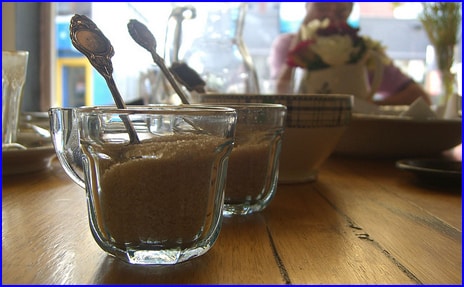
Looking at the brain’s reward circuits is a hot research area, and sugar is one of the favorite substances to experiment with. Consequently, the past 12 months have been rich in sugar addiction news.
At the Oregon Research Institute, researchers started with 151 healthy, normal-weight teenagers. Some pigged out on ice cream for a period of time, while the others refrained. Then, the subjects were brought together with fMRI devices and milkshakes. The result, as measured by advanced technology:
… [T]eens who had eaten the most ice cream recently got the least amount of joy out of the experimental milkshake.
Habituation is one word for this phenomenon. Writer Sasha Orman says food addiction is “a very real thing,” and the milkshake experiment showed the kids’s experience was “parallel to the diminishing returns of drug addicts consuming more in a futile attempt to chase their first high.” It takes an increasing amount of the substance to get the same pleasurable effect, and sometimes that initial euphoria can never be reachieved. It’s what traditional opium addicts called “chasing the dragon.”
Kyle S. Burger and Eric Stice, the lead researchers, could not help noticing the similarity between their subjects’ reactions to sweet treats and the reactions of drug addicts to their substances of choice. Nevertheless, Burger told an MSNBC reporter:
I personally do not say food is addictive. I say energy-dense food, high sugar food, can elicit neural responses during consumption that parallel those seen in drug addiction. So it has addictive-like properties.
Ice cream was maybe not the best substance for that experiment, because it contains both sugar and milk, which is also apparently addictive for some humans (the PDF transcript is downloadable from this page). Dave Asprey of The Bulletproof Executive says that dairy protein can be very allergenic and inflammatory:
[…] and in a lot people it can convert into something called a casomorphin if it’s not digested properly and casomorphin is, as it sounds, like — morphine‖. It actives opiate receptors in your brain and if you’re one of those people who absolutely craves milk and you have to have cups of milk every day and you can’t live without your ice cream, well you may be one of those people who has a little bit of an opiate response to milk.
Food, sex, and exercise are all supposed to be intrinsically rewarding to a healthful extent. Random chemicals wandering around in the brain have the power to unbalance the reward system and throw everything into chaos. Sweden’s Uppsala University contributed a study of how the dopamine reward system can get hijacked by too much sugar. Daily Mail reporter Rob Waugh interviewed Associate Professor Asa Mackenzie, the lead researcher, and told readers:
In the brain, dopamine works in conjunction with a brain receptor glutamate which is a crucial chemical in assisting memory… Researchers found that mice who were unable to ‘co-signal’ — as the process is known — would consume more cocaine and sugar than control mice. The mice that were unable to co-signal developed strong memories of drug-taking environments…. The mice seemed to remember places where they had ‘drug experiences’ better.
Bottom line, sugar is a drug, as packed with action and repercussions as any other drug. What this place/memory phenomenon might imply about obesity and food addiction is not yet clear, but chances are, it will turn out not to be good, and the subject is worth some thought.
Your responses and feedback are welcome!
Source: “Ice Cream as Addictive as Drugs Says Reseachers,” Food Digital, 02/27/12
Source: “Podcast #12,” The Bulletproof Executive, 11/25/11
Source: “Addiction to cocaine and sugar could be caused by the SAME faulty ‘circuit’ in the brain,” Daily Mail, 03/13/12
Image by avlxyz (Alpha).

 FAQs and Media Requests:
FAQs and Media Requests: 











